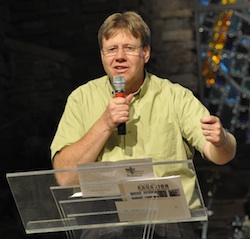Grass-roots Personhood Movement Gains Momentum
 A grass-roots organization seeking to pass state amendments defining a fertilized egg as a person is building momentum nationwide as the group marks its first anniversary this month.
A grass-roots organization seeking to pass state amendments defining a fertilized egg as a person is building momentum nationwide as the group marks its first anniversary this month.
Personhood USA has groups formed in more than 30 states, with several poised to introduce legislation or ballot initiatives in 2010. Founder Cal Zastrow, a longtime pro-life activist and licensed Assemblies of God minister, said the success of marriage amendments motivated him to lobby for personhood initiatives.
“We’ve got a lot of churches that won’t get involved in street ministry, they won’t get involved in crisis pregnancy centers, they won’t get involved in voting, but some of them will circulate a petition,” he said.
The personhood effort stems from a statement Justice Harry Blackmun made in the Supreme Court’s 1973 ruling on Roe v. Wade, which legalized abortion. Responding to the argument that a fetus is a person under the 14th Amendment, Blackmun wrote, “If this suggestion of personhood is established [Jane Roe’s] case, of course, collapses, for the fetus’ right to life would then be guaranteed specifically by the amendment.”
Previous efforts to define an unborn child as a person have been unsuccessful, including a 1983 bill that failed in Congress by just 18 votes. Since then, pro-life groups have worked to restrict abortion through parental consent laws or ultrasound requirements.
Zastrow says such laws regulate murder. “We come along and say: “No, those are persons. Churches, our culture and our laws must protect all innocent persons,'” Zastrow said. “A person’s a human being at their biological beginning. It just resonates with people. They get it, they understand it, and they get fired up for it.”
Colorado residents didn’t exactly get it last year when Personhood USAÂ launched its unofficial first ballot initiative. Amendment 48 lost by a wide margin, gaining just 27 percent of the vote.
Gualberto Garcia Jones, who is leading an effort to put a personhood amendment on Colorado’s 2010 ballot, said the 2008 campaign succeeded at educating his state about the humanity of the unborn. “The purpose is to reach out to the people,” he said. “We had over half a million people in Colorado who voted in favor of granting full legal rights to all human beings.”
Zastrow says a poll taken before the 2008 election showed just 9 percent of Colorado residents believed a human being was a person at conception and should be protected. That support had tripled by Election Day.
Despite its grass-roots popularity, some pro-life groups are wary of the personhood strategy. The Florida Catholic Conference, which represents the state’s bishops, refused to support a personhood petition effort launched in Florida this fall. Focus on the Family Action has also opted not to support the Personhood campaign.
Rather than overturning Roe v. Wade, the groups worry that a personhood amendment brought before the wrong Supreme Court could lead to a strengthening of the nation’s abortion laws. “If you have the right court that’s amenable to changing the current policy on abortion, you could have a parental notice bill that could be used to overturn Roe,” said Carrie Gordon Earll, senior director of issue analysis for Focus on the Family Action.
“Before the wrong court, a more pro-abortion court, a personhood amendment could instigate a ruling that would say we’re going to elevate abortion to even a higher level,” she added. “And there are members of the court who have written of their intention to do just that when the opportunity presents.”
Zastrow takes a different view. “My philosophy is, these are people,” he said. “And I like the three-word quote from the civil rights movement: “Wait means never.'”
He and other personhood advocates say a Supreme Court ruling against a personhood amendment would spur grass-roots supporters to greater activism, much like the 1857 Dred Scott decision that denied African-Americans citizenship stirred Northern opposition to slavery.
“[The Supreme Court] made a lot of people mad, and there was a lot of social tension, and it was actually the social tension that was brought about which created the 13th and the 14th amendments,” said Personhood co-founder Keith Mason.
He says current restrictions haven’t reduced abortion by a large measure. Statistics released last year found that abortion had dipped to an all-time low of 1.2 million in 2005 from a peak of 1.6 million in 1990.
“There are miniscule restrictions on [abortion] that actually don’t save the life of one child,” Mason said. “It’s really bad, and I don’t see how it could get much worse. It is so bad that anything that we do to actually fight on the issue is going to improve it.”
Although Focus does not endorse the personhood strategy, Earll said her organization supports its goal. “The question of when life begins is important, and having that debate in the public square is a good thing,” she said.




























































